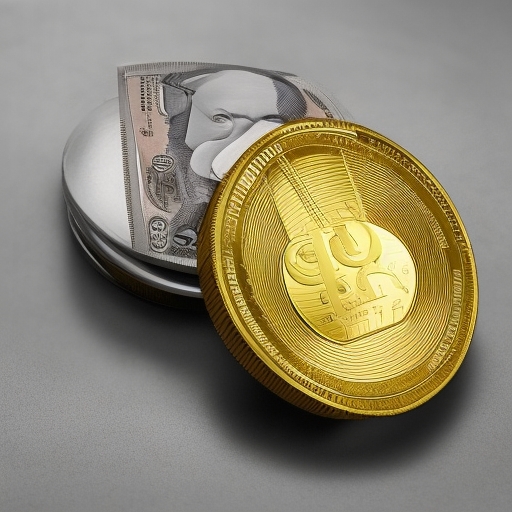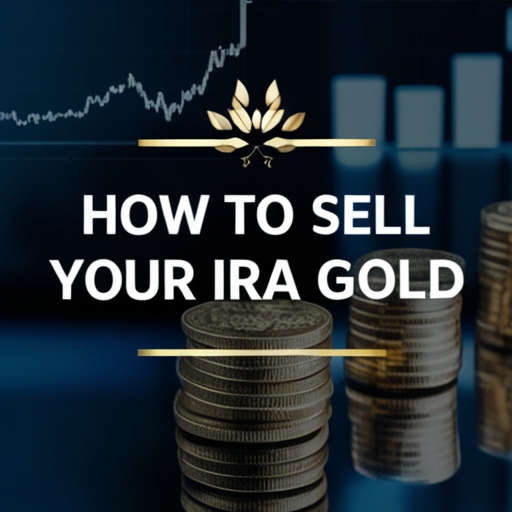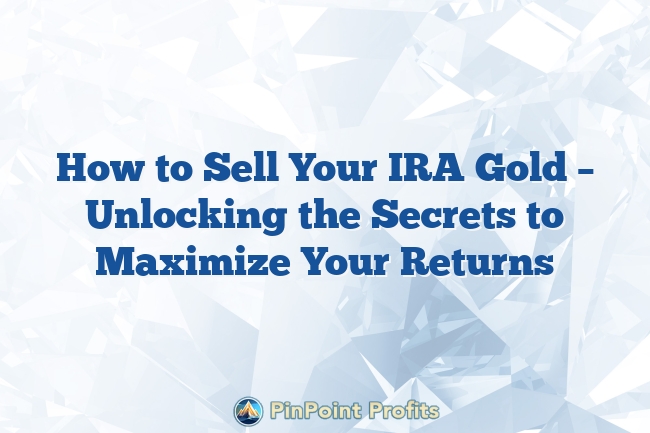Liquidating your IRA gold account can be a significant decision for your retirement strategy. Understanding the process, considerations, and potential impacts is crucial for making an informed choice. This comprehensive guide will walk you through every aspect of selling your IRA gold, from evaluating its value to navigating tax implications and exploring alternatives.
| Key Points | Description |
|---|---|
| Process Overview | Contact IRA custodian, complete paperwork, arrange sale, deposit proceeds |
| Value Evaluation | Check gold spot price, consider type and condition, consult appraiser |
| Tax Implications | Income tax on proceeds, potential penalties for early withdrawal |
| Buyer Selection | Research reputable dealers, compare offers, ensure IRS compliance |
| Alternatives | Transfer to another IRA, take a loan, hold as hedge against inflation |
Understanding the Process of Selling Your IRA Gold
Selling gold from a self-directed IRA involves a series of steps to ensure compliance with IRS regulations. The process begins by contacting your IRA custodian to initiate the sale.
Your custodian will guide you through the necessary paperwork and ensure all transactions adhere to legal requirements. It's important to note that IRS-approved gold must be stored in a precious metals depository.

Once the paperwork is complete, your custodian will arrange the sale of your gold bullion or coins. The proceeds from the sale will be deposited directly into your IRA account, maintaining its tax-deferred status.
This process ensures that your retirement portfolio remains intact while allowing you to liquidate your gold assets. It's crucial to follow these steps precisely to avoid any potential tax penalties or legal issues.
Key Considerations Before Selling
Before deciding to sell your IRA gold, several factors warrant careful consideration. First and foremost, evaluate the current gold spot price to determine if it's an opportune time to sell.
Assessing your overall retirement portfolio is crucial to ensure that selling gold aligns with your long-term investment strategy. Consider how this sale might impact your portfolio diversification and inflation protection.
Understanding the tax implications of selling gold from your IRA is vital. Consult with a financial advisor to gain clarity on how this transaction might affect your tax situation.
Lastly, factor in the fees associated with selling gold, such as custodial services and metals exchange fees. These costs can significantly impact your overall returns and should be carefully considered before proceeding with the sale.
How to Evaluate the Value of Your Gold
Accurately evaluating the value of your gold is a critical step in the selling process. Begin by checking the current gold spot price, which fluctuates based on market conditions and serves as a baseline for your gold's value.
Next, consider the type of gold you own. Gold bars, coins, and bullion each have different values based on their purity and weight. The condition of your gold also plays a role in its value, with pristine pieces commanding higher prices.
For the most accurate valuation, consider consulting with a professional appraiser. Their expertise can provide valuable insights into your gold's worth, helping you set a realistic selling price and maximize your returns.
Finding the Right Buyer for Your Gold
Selecting the right buyer is crucial for a successful and profitable sale of your IRA gold. Start by researching reputable precious metals dealers and metals exchanges with strong track records and positive customer reviews.
Compare offers from multiple buyers to ensure you're getting the best price for your gold. Consider working with a buyer who offers custodial services, as they can handle the logistics of the sale more efficiently.
Ensure that your chosen buyer complies with IRS regulations to avoid any legal complications. Some sellers opt to sell their gold through auctions or online marketplaces, which can potentially yield higher returns but may require more effort on your part.
Tax Implications of Selling Gold from Your IRA
Understanding the tax implications of selling gold from your IRA is crucial for making an informed decision. In most cases, the proceeds from the sale are subject to income tax.
However, if your gold is held in a Roth IRA, you may be able to avoid taxes on the sale. It's essential to consult with a tax professional to understand your specific tax situation and potential obligations.
Consider how the sale might impact your IRA contribution limits. Selling gold could affect your ability to make future contributions to your IRA, depending on your individual circumstances.
Be aware of any penalties for early withdrawal if you're under the age of 59½. These penalties can significantly impact your returns, so it's crucial to factor them into your decision-making process.
Strategies to Maximize Returns
To optimize your returns when selling IRA gold, consider implementing these strategies:
1. Time your sale when the gold spot price is high
2. Sell gold in smaller increments to take advantage of price fluctuations
3. Minimize fees associated with the sale
4. Reinvest proceeds into other tax-deferred investments
By carefully timing your sale and minimizing associated costs, you can potentially increase your overall return. Consider reinvesting the proceeds into other tax-deferred investments, such as a gold-backed IRA or gold ETF, to maintain a diversified retirement portfolio.
Common Mistakes to Avoid
When selling your IRA gold, be mindful of these common pitfalls:
- Rushing the process without proper research
- Selling when the market is down
- Liquidating all gold holdings at once
- Neglecting tax implications
Take your time to research buyers and evaluate your gold's value thoroughly. Avoid selling when the market is unfavorable, as this can result in lower returns.
Consider maintaining some gold holdings as a hedge against inflation and a safe-haven asset. Lastly, don't overlook the tax implications of the sale. Consult with a tax professional to ensure you're making an informed decision.
Legal Requirements and Compliance
Adhering to legal requirements is paramount when selling IRA gold. Ensure that your gold is IRS-approved and stored in a recognized precious metals depository.
Work with a buyer who is compliant with IRS regulations to avoid potential legal issues. Complete all necessary paperwork with your IRA custodian, including documenting the sale and ensuring that the proceeds are properly deposited into your IRA account.
Consider consulting with a legal professional to ensure you're meeting all legal requirements. This extra step can provide peace of mind and help you avoid any compliance-related complications.
Alternatives to Selling Your Gold
Before committing to selling your IRA gold, consider these alternatives:
Transferring your gold to another IRA account, such as a Roth IRA or gold-backed IRA, can help maintain your tax-deferred investment status while potentially offering different benefits.
Taking a loan against your gold allows you to access funds without selling your assets. This option can be particularly useful if you believe gold prices will rise in the future.
Holding onto your gold as a hedge against inflation and a safe-haven asset might be wise, especially during times of economic uncertainty. Consider diversifying your retirement portfolio with other precious metals, such as silver or platinum, to spread risk.
Market Trends and Their Impact on Gold Sales

Understanding market trends is crucial when considering selling your IRA gold. Monitor the gold spot price regularly to identify the best time to sell. Economic factors such as inflation rates and interest rates can significantly influence the demand for gold and its price.
Geopolitical events often have a substantial impact on the gold market, as investors tend to flock to gold during times of uncertainty. Stay informed about global events that could affect gold prices.
Consult with a financial advisor to gain insights into how current and projected market trends may impact your gold sale. Their expertise can help you make a more informed decision about when and how to sell your gold.
How to Safely Store Gold Before Selling
Proper storage of your gold is crucial before selling. Ensure that your gold is stored in a reputable precious metals depository to protect it from theft and damage.
Consider insuring your gold to safeguard against potential loss. Maintain detailed records of your gold, including its value and condition, to help you set a realistic selling price when the time comes.
Consult with your IRA custodian to ensure your gold is stored in compliance with IRS regulations. Proper storage not only protects your investment but also ensures you remain compliant with legal requirements.
Conclusion: Making the Most of Your Gold Sale
Selling your IRA gold can be a strategic move for your retirement portfolio when done thoughtfully and with proper planning. By understanding the process, evaluating your gold's value accurately, and finding the right buyer, you can maximize your returns.
Consider the tax implications and legal requirements to ensure a smooth transaction. Explore alternatives to selling, such as transferring your gold to another IRA account or taking a loan against it, if they better align with your financial goals.
Monitor market trends to determine the optimal time to sell, and ensure your gold is safely stored before the sale. By following these steps and considering all aspects of the sale, you can make the most of your gold investment while maintaining a diversified retirement portfolio.
What are the tax implications of selling gold from an IRA?
Typically, proceeds are subject to income tax. However, Roth IRA holders may avoid taxes. Consult a tax professional for personalized advice.
How can I evaluate the value of my gold?
Check the current gold spot price, consider type and condition, and consult a professional appraiser for an accurate valuation.
What are some alternatives to selling my gold?
Transfer to another IRA, take a loan against it, or hold as a hedge against inflation. Diversifying with other precious metals is also an option.

